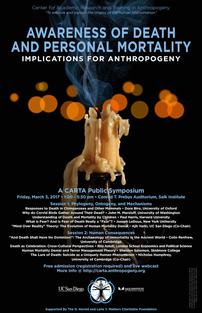Free, Public Symposium on "Awareness of Death and Personal Mortality: Implications for Anthropogeny"
Posted by Ingrid Benirschke-Perkins on Jan. 12, 2017, 12:38 p.m.

Join the live webcast! Awareness of Death and Personal Mortality: Implications for Anthropogeny is the topic of a free public symposium hosted by the UCSD/Salk Center for Academic Research & Training in Anthropogeny (CARTA) on Friday, March 3rd (1:00 – 5:30 pm PT), co-chaired by Nicholas Humphrey (Univ of Cambridge) and Ajit Varki (UC San Diego). While certain warm-blooded social animals and birds appear to react selectively and specifically to the death of other members of their group, humans seem to be very unusual in the quality and extent of our responses, and in the ability to translate these experiences into an understanding of our personal mortality. When during childhood do these levels of understanding emerge? What is the underlying neurobiological basis for fears of death and mortality? When during human evolution did these fears emerge, and how did our ancestors tolerate them without sinking into an evolutionary dead end of depression or hopelessness? Assuming we found a solution to this dilemma, why are we still the only mammals that commit suicide? What does the archaeological, historical and cross-cultural record tell us about these matters? And what are the consequences for our current human condition, ranging from self-esteem to social organization, to political leanings? This symposium will bring together expert speakers from a wide range of different disciplines that are relevant to seeking answers to these questions. In the process we will gain a better understanding of how increasing awareness of death and personal mortality shaped the origin of humans. Access the live webcast here on March 3rd: https://carta.anthropogeny.org/events/awareness-death-and-personal-mortality-implications-anthropogeny
